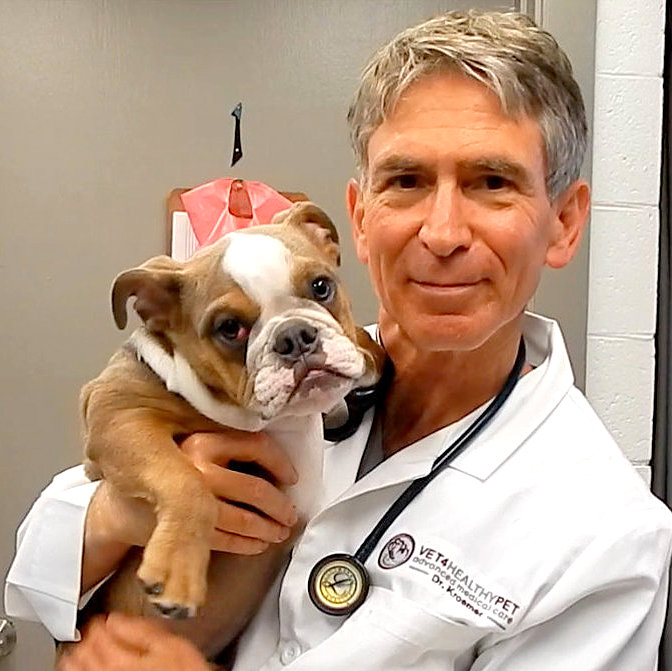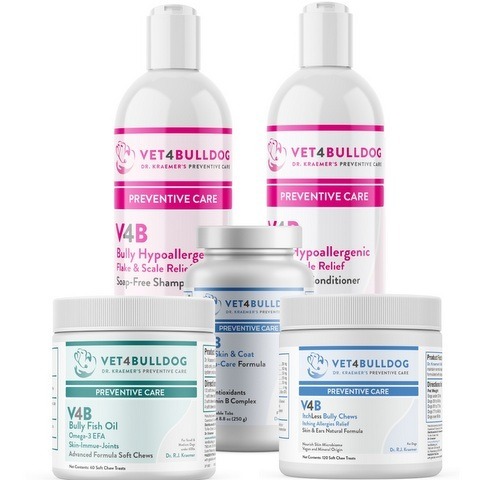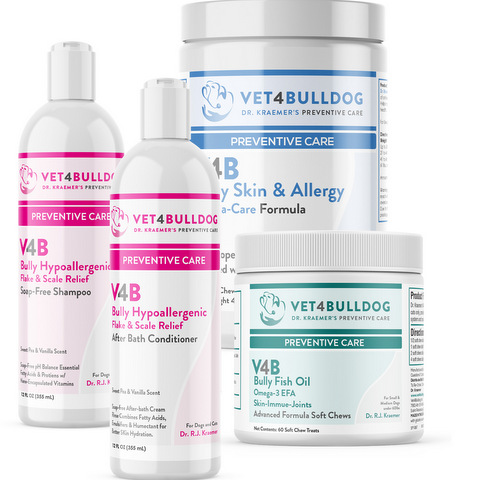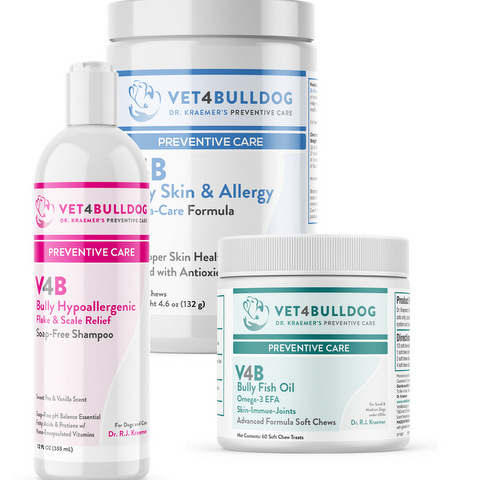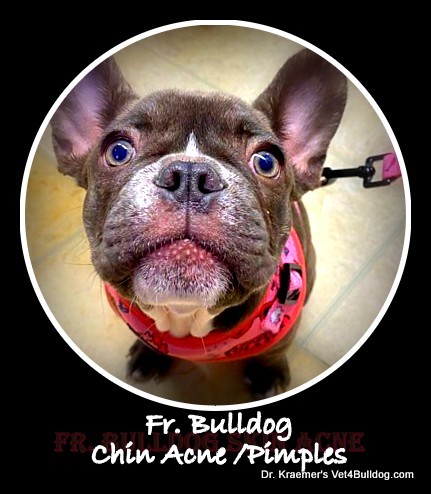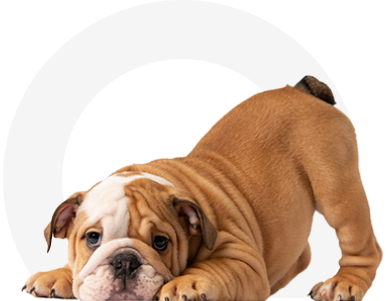Dry, flaky skin in bulldogs and French bulldogs is the most common seborrhea type.
Oils, or sebum, are produced in the sebaceous glands.
Dry Flaky Skin in Bulldogs and French Bulldogs SEBORRHEA TYPES:
BULLDOG DRY SEBORRHEA
“Sicca” stands for “dry,” as “Bulldog Keratoconjunctivitis Sicca (KCS) stands for “Bulldog Dry Eye”.
Many bulldogs with skin disease suffer from the “sicca” type.
There are two types of bulldog seborrhea: dry, flaky seborrhea,
- PRIMARY DRY SEBORRHEA: is less common
- SECONDARY DRY SEBORRHEA: the more common one that can be divided into two types
- NON-ITCHY
- ITCHY: which is the most common dry-seborrhea
BULLDOG OILY GREASY SEBORRHEA
Few bulldogs with skin disease suffer from the oily greasy type
Dr. Kraemer’s Bulldog Dry Flaky Skin RULE OF THUMB:
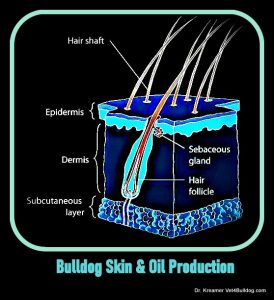
Most Dry Flaky Skin in Bulldogs and French Bulldogs is secondary to other bulldog skin diseases, thus for the best therapeutic outcome, the underlying cause should be identified.
Dry Flaky Skin in Bulldogs and French Bulldogs / PRIMARY DISEASE:
Primary seborrhea is much less common in bulldogs and is usually due to a keratinization defect or abnormal cell turnover. The distribution is usually wide and often includes the ears and ear flaps.
A primary seborrhea is typically a genetic, hereditary condition, thus it is likely to manifest early in life.
BULLDOG PRIMARY DRY SKIN DISEASE TYPES:
- Bulldog Idiopathic Dry Flaky Skin (unknown reason)
- Bulldog Vitamin A Responsive Dry Flaky Skin
- Bulldog Sebaceous Adenitis (inflammation of the sebaceous glands)
- Bulldog Ear Margin Dermatosis
- Bulldog Acne
- Bulldog Naso-Digital Hyperkeratosis
Dry Flaky Skin in Bulldogs and French Bulldogs / SECONDARY DISEASE:
Secondary bulldog seborrhea sicca is the most common and usually is an itchy one.
Your bulldog may often exhibit symptoms of itching along with a dry, flaky, and scaly coat. While itching is a common symptom associated with secondary bulldog seborrhea, it’s important to note that several underlying conditions within this category do not lead to itch.
BULLDOG DRY SKIN DISEASE ITCHING TYPE
They are secondary to common bulldog and French bulldog skin conditions, such as:
- Bulldog Atopic Itch Allergic Dermatitis
- Bulldog Food Allergy Dermatitis
- Bulldog Yeast Dermatitis
- Bulldog Pyoderma
- Bulldog Scabies
- Skin Disease Due To Gut Dysbiosis and Leaky Bowel Syndrome
BULLDOG DRY SKIN DISEASE NON-ITCHING TYPE:
- Bulldog Demodex Red Mite
- Bulldog Endocrine Diseases like Bulldog hypothyroidism and Bulldog Cushing Syndrome
- Bulldog Pemphigus (sometimes)
- Bulldogs living in a dry, low-humidity geographic location
Dry Flaky Skin in Bulldogs and French Bulldogs DIAGNOSIS:
- Age, History, and Distribution are all vital for the diagnosis
- Skin Scraping: to r/o Demodex and Sarcoptic Mange
- Skin Cytology: to r/o bacteria, yeast, and abnormal cells
- Skin Biopsy: for histopathology
- Allergy Blood Testing (VARL): for Atopic Dermatitis
- Food Trial (RX elimination diets): for food allergies
Dry Flaky Skin in Bulldogs and French Bulldogs / TREATMENT:
Topical therapy and Supplements are essential for all Bulldog Dry and Flaky Skin Disease, as well as Bulldog Oily Greasy Flaky Skin
- FREQUENCY: 1-2 weeks in the beginning, then as needed for maintenance.
- CONTACT TIME: shampoos & conditioners, contact time is 10–15 minutes before rinsing.
- HYDRATION: Humectants & Emollients 10–15 minutes of minimum contact time are needed to allow proper hydration of the skin.
They are often applied as an after-shampoo conditioner or mixed in them.
- Humectants attract water.
- Emollients prevent water loss and soften the skin.
KERATOLYTIC & KERATOPLASTIC: to help remove scales and flakes.
ANTI-PRURITIC: to help reduce the itch.
ANTISEPTIC: to help manage secondary bacterial infection.
ANTI-YEAST: to help manage secondary yeast infection.
DEGREASERS: For bulldog oily flaky greasy skin (Bulldog Oily Seborrhea) to help flush the hair follicles and remove excess oils.
BATHING: once or twice a week with medicated shampoo.
MOUSSING & GELLING: on non-bath days.
THERAPEUTIC TOPICALS FOR BULLDOG DRY SKIN
BULLDOG MEDICATED SHAMPOOS:
Provided here are various medicated shampoos you should implement depending on the skin state, itchiness, and presence of infection:
- Oily Greasy Bulldog: V4B Oily Bully Medicated Shampoo
- Dry Flaky Bulldog: V4B Bully Hypoallergenic and V4B Bully Aloe Oatmeal Medicated Shampoos
- Itch Bulldog: V4B Itchy Bully Medicated Shampoo
- Infected Bulldog: V4B Bully Antiseptic Extra Strength and V4B Antiseptic Yeasty Bully medicated shampoos
- Yeasty Bulldog: V4B Antiseptic Yeasty Bully Medicated Shampoo
BULLDOG DRY SKIN NO RINSE LOTION & GELS:
Bully no-rinse gels and lotion should be used in between baths.
They are extremely easy to use, and no rinsing is needed.
- ITCHY BULLDOG: V4B Itchy Bully Gel w/PS
- INFECTED BULLDOG: V4B Yeasty Bully Gel
- SKINFOLD DERMATITIS BULLDOG: V4B Bully Skin Fold Lotion w/PS
BULLDOG DRY SKIN AFTER-SHAMPOO CONDITIONER:
BULLDOG DRY SKIN SPRAY & WIPES:
- Antiseptic, Anti-Yeast Bundle
- SPRAY: V4B Bully Skinfold Antiseptic Spray
- WIPES: V4B Bully Skinfold Antiseptic Extra Large Wipes and Small Wipes
BULLDOG DRY SKIN SUPPLEMENTS:
- V4B Bully Fish Oil EFA chews Anti-Inflammatory & Skin Barrier Repair:
- V4B Bully Multivitamins Formula
- V4B Bully Pre & Probiotics, V4B Bully Immune Support.
- Vit A, Retinoids
BULLDOG DRY SKIN ITCH CONTROL:
Often itch control RX is needed at the early intense, acute phase.
BULLDOG DRY SKIN RX ANTISEPTIC:
Often Antibacterial & Antifungal systemic RX are needed during the acute phase to help eliminate the secondary infection.
Dr. Kraemer’s Dry Skin in Bulldogs and French Bulldogs TIPS & WARNINGS:
Bulldog Dry Skin TOPICALS & SUPPLEMENTS TIP:
Topical therapy that includes medicated shampoos, after-shampoo conditioners, No-Rinse mousses, and gels, as well as complementary therapeutic supplements is critical for the short and long term.
- SAFE: They Are Safe and thus can be used long-term.
- $: They Are Inexpensive.
- EASY: They are easy to implement.
- CONVENIENT: They are done at home.
- TREATS: Supplements are available in chews and given as treats.
BULLDOG SHAMPOOS & CONDITIONERS :
Medicated shampoos and conditioners should be used:
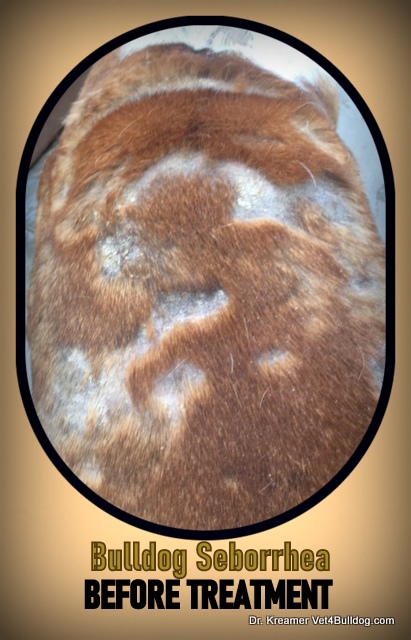
- FREQUENCY: Bi-weekly during the acute phase, and less frequently thereafter.
- CONTACT: Contact before rinsing should be 10-15min.
- WATER TEMP: If there is inflammation (redness) you should not bathe with hot/warm water.
- IDEAL COMBO: Most times a combination of multiple medicated shampoos, wipes, gels, and sprays is needed.
BULLDOG PRIMARY SEBORRHEA SICCA:
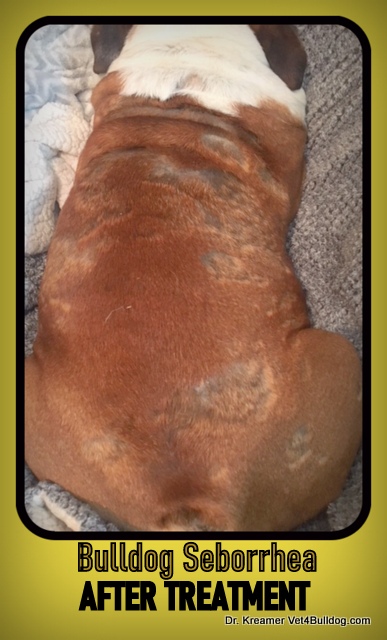
- Less common than secondary seborrhea sicca
- Genetic/Inherent, thus often shows up at a young age
- Same treatment, some might need Vit A, Zinc, Retinoid
BULLDOG FLAKY BULLDOG ITCHING TIP
The common pruritic types are:
- Bulldog itch atopic allergic dermatitis
- Bulldog food allergy allergic dermatitis
- Bulldog flea allergy
FLAKY BULLDOG NON-ITCHING TIP
Common nonpruritic types are:
- Bulldog Demodex
- Bulldog hypothyroid
- Bulldog Cushing syndrome
- Bulldog dry, non-humid geographic location
BULLDOG DRY SKIN TREATMENT DURATION TIP
Treating the acute phase is usually 2-3 months in duration pending improvements.
BULLDOG DRY SKIN RX ITCH CONTROL WARNING
Controlling itch is crucial to prevent self-trauma and damage to your bulldog’s skin barrier. In severe or acute cases, medication may be necessary to manage the itching.
However, it’s important to exercise caution as cortisone, steroids, and pred are commonly prescribed for their effectiveness in reducing itchiness.
Despite their initial benefits, prolonged use of these medications can lead to significant adverse effects.
FLAKY BULLDOG SKIN RX ANTISEPTIC WARNING
secondary bacteria (Staphylococcus ) and yeast (Malassezia) infections are common and often require systemic medication.
BULLDOG SEBBORHEA RX HARMFUL SIDE EFFECTS WARNING
Many of the medications (RX) used can lead to side effects over time:
- STEROIDS: Steroids can lead to iatrogenic Cushing syndrome and a long list of serious medical problems.
- ANTIBIOTICS: Antibiotics can lead to the superbug, multidrug-resistant bacteria, MRSP.
- ATOPICA: Atopica often causes nausea and diarrhea.
- APOQUEL: Apoquel is a possible immune suppressant when given twice a day.
All RX can negatively impact your bulldog’s GI microbiome (“good “ gut microflora), which can lead to dysbiosis and leaky gut syndrome.
Dry Flaky Skin in Bulldogs and French Bulldogs SUMMARY MUST DO:
- TOPICAL & SUPPLEMENTS (NON-PRESCRIPTION): Always implement topical therapy and supplements.
- DIAGNOSIS BASED: Systemic RX should be given based on diagnostic testing findings.
- PRESCRIPTION RX: RX should be prescribed for maximum impact, at the minimal dosage, and for the shortest optimal duration.
In contrast to prescription drugs, therapeutic supplements and topicals are :
- SAFE: for long-term use
- $: inexpensive, affordable
- EFFECTIVE: very effective when used correctly
- EASY & CONVENIENT: used at home and easy to do
Recommended by Owners Approbed by Bulldogs



